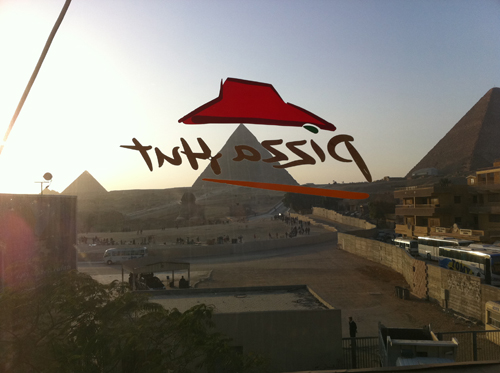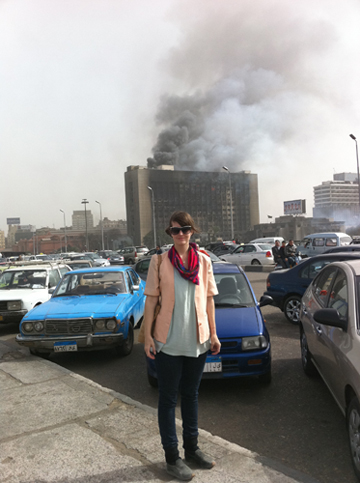May you live in interesting times…
This ambiguously Chinese curse implies that interesting (i.e. historically significant) times are usually not peaceful ones. They are times of change and therefore, times of uncertainty, insecurity, and sometimes violence. Shakespeare’s brooding Prince of Denmark, Hamlet, would have agreed completely, lamenting “that the time is out of joint.” For him the times are all too “interesting” – his uncle killed his father and married his mother to take the throne – and unfortunately for Hamlet, his dead father’s ghost haunts him, pleading Hamlet to take revenge, curing the ailing kingdom. But time can be out of joint in another sense not relating to societal ills, but rather to experience itself. From moment to moment, our experiences are conditioned by the traces of non-present time, memories of the past and anticipation of future, which meander through our unfolding present, forging connections and producing meaning. Times may not always be interesting, but time (and space, at that) is always out of joint.
I am writing this on February 25, exactly one month after the demonstrations-turned-protests-turned-revolution began in Egypt. On January 25, I was returning to Cairo from Alexandria on a violently bouncy micro-bus via the not particularly picturesque desert between the two cities. I was to spend the rest of January in Cairo after completing a workshop lead by Alex Freedman and myself at MASS-Alexandria, a new residency program for young Egyptian artists founded by Wael Shawky. After 30 years of Mubarak’s rule, the Egyptian Revolution began the day after our workshop (aptly titled Future Tense) ended and times were certainly interesting. Marty McFly accidentally traveled 30 years back in time, forcing him to reconstruct the past so he would still be born in the future. Now, one month later, I am reconstructing my experience backwards in time, down the slippery Slip ‘N Slide® of synchronicity, attempting to make meaning out of a very strange month in my life.

View of pyramids at Giza from inside Pizza Hut, January 27, 2011. Photo by Lindsay Lawson.
Simply put, the construction of meaning is the recognition of patterns in the world. It is an inherently personal process, in which two or more memories, thoughts, and/or experiences are considered to have some kind of relationship. It sounds a lot like the process of artmaking. Taken further it is magical thinking, associative thinking, the formulation of conspiracy theories, superstitions, synchronicity, and post hoc ergo propter hoc (a logical fallacy that if A occurred, then B occurred, therefore A caused B). These are all ways in which one attempts to connect acausal events into a coherent narrative. Glenn Beck does this everyday. The 14 deaths attributed to King Tut’s curse can be explained with this logic. Perhaps it is in human nature to seek an overarching structure when there is none.
This January had been my first and only time in Egypt, coincidentally a historic time and place in history. After one month has passed, I still find some of my experiences incompatible with each other in that they do not fit into a single narrative, but instead they are strange, multifaceted, and out of joint. Rather than attempt to formulate a complete narrative, I will offer a fractured one. Below (in no particular order) are a few highlights, moments of coincidence from that experience that I found most notable. The gaps in between are sites for the construction of meaning and, perhaps, the beginning of art-making.
[youtube:https://www.youtube.com/watch?v=6Ota5npvFUQ]
During the protests a man went wakeboarding down the Nile, as he does every Friday, while people on the shore ran away from police and tear gas.
On the day the Egyptian Revolution began, I found a human femur bone on the side of the road next to a few stray dogs on my way to a glass factory in the middle of a slum.
At an outdoor book market, I purchased a 1996 Reader’s Digest (in English) containing articles about Y2K, the power of handshakes, gluteal workouts for business women, and what colleges really look for.
In Alexandria, during a span of about five days, four items that had particularly caught my eye in various shop windows had vanished the next time I passed.
One large column inside the Egyptian Museum had patches of color painted on its back side, presumably as test swatches, since these same colors covered the other wings of the museum.
At one point, I could see buildings on fire in any direction from my apartment in Cairo on the 24th floor.
A trail of blood drops on the stairs in my hotel in Alexandria stopped abruptly at the doctor’s office on the 2nd floor and remained there for five days.
Many small outdoor kiosks selling books and other things carried copies of Mein Kampf in Arabic.
On my way to the airport, I stopped in a bagel shop in Cairo, perhaps the only one in the city, when jet planes started flying low over the city creating (intentionally?) unnerving loud noise.
I had to download a flashlight app for my iPhone because the power kept going out in our building.
While camping out in the airport, I met a French man who had been hired to train the Egyptian police only days before the revolution. He was never able to meet any of his contacts and had not yet been paid.
Among the millions of people in and around Tahrir Square, I ran into someone I knew from Alexandria.
While in a taxi stopped at a military checkpoint, an Egyptian soldier casually pointed his gun in my face as he checked my passport.
When asking for directions to Sheikh Ali, the only gay bar in Egypt, a shopkeeper told me to “ask any man, he will know.”
After Mubarak stepped down, a friend still in Cairo told me that people were organizing a joke protest with signs that read, “Come back Mubarak, we were only joking.”
Sustaining no injuries while in Egypt, I drilled into my thumb the day I arrived in Berlin as I tried to put a hole in a leftover 50 Piastre coin.

Lindsay Lawson in front of the National Democratic Party Headquarters in Cairo, January 29, 2011. Photo by Alex Freedman.





Pingback: Weekend Links: The disjointed, sickly edition | Stephanie Vegh